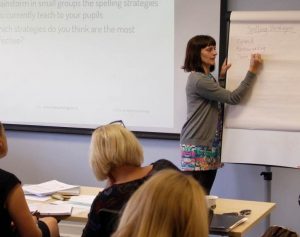Promoting spelling
This blog is a summary of everything I learnt, or thought was important from the promoting spelling part of our CPD event in June 2018.
Literacy skills can greatly influence progress in all areas. However, there is limited research in how to learn word level literacy skills. As a result, this may cause those who struggle to fall behind. Consequently, this begs the question, why is there such a great emphasis on correct spelling by The National Curriculum?
What does the research tell us?
“Schemes for children who struggle with spelling work best when it is highly structured – this is most effective delivered little and often.” Brooks, 2016.
The following strategies, in each area, need to be explicitly taught: Phonological strategies: how words SOUND Visual strategies: how words LOOK Morphemic strategies: the MEANING of words and how words can be CHANGED Etymology based strategies: the ORIGINS of words
Spelling strategies
All spelling strategies fall into five main categories; phonemic awareness, morphological awareness, whole-word approach, the rule-based strategy and multi-modal teaching.
Phonemic awareness is the letter-sound correspondence. Additionally, it is also individual parts that make up a word.
Morphological awareness is the process of understanding/recognising similar chunks. Whereas the whole-word approach is simply memorising the word alone.
Lastly, the rule-based strategy teaches explicit spelling rules. The multi-modal teaching is where the child learns through a variety of modes, e.g. seeing, feeling, hearing, creating etc.

Individual spelling styles
When dealing with children and spelling, we need to focus on the child as an individual. Brooks and Weeks devised 10 key strategies to try when teaching spelling. These include; Neurolinguistic programming, Onset-Rime, Look-Cover-Write-Check, Own-voice, Tracing, Simultaneous oral spelling, Picture association, Mnemonics, Phonics, Look-say (Brooks, P., & Weeks, S. (1999). Individual Styles in Learning to Spell: improving spelling in children with literacy difficulties and all children in mainstream schools).
Certainly there are a number of ways to support spelling using individual spelling styles in key stage 1 (KS1), key stage 2 (KS2) and key stage 3 (KS3) and beyond, such as:
Supporting KS1
- Phonics
- Matching phoneme to grapheme
- Sounding out
- Phonic spelling dictionary
- Play spelling games
Supporting KS2
- Over pronunciation
- Individualised wordlists
- Highlight tricky middle sounds
- Spelling games
- Introduce spelling strategies
- Reflect on what works best with each child, then encourage continuation
KS3 and beyond
- Review and share individualised spelling strategy list
- Assistive technology
- Unfortunately there is a need for more research into KS3 and beyond
As someone starting their psychology career, most noteworthy I certainly enjoyed listening to everyone sharing what works well for them in their education settings.
Finally, our promoting spelling CPD is available onsite to education settings and made bespoke for the ages and levels of need. If you have any questions then please contact us to find out more=











